A team of researchers has developed a truly wireless rechargeable battery to be implanted under a patient’s skin. It will be used to power various medical bioelectric chips.

THE bioelectric implants have been a reality for several years now. Transplanted under the skin generally, they deliver the necessary medications to patients who require permanent or regular treatment. Some are sensors that record the heart rate or monitor the level of an element in a patient’s body, for example. Like all systems partly composed of electronic elements, they must be powered. But if the progress of implants is quite significant, this is not the case for sources of energy associated.
To overcome this lack, researchers from Lanzhou University in China have developed a real wireless charger graftable under the skin. Fully biodegradable, it can receive and transmit energy to power another implant for a fairly long period of time. Currently, chips of this type are often usable only once and lack power for biomedical application. There are also chargers attached to the skin, but inflammation problems ultimately make them impractical.
A team of scientists creates a wireless charger to be implanted safely in the human body
This new type of implant is composed of a magnesium coil which charges the device when an external transmission coil is placed on the skin, above the implant. The energy then passes through a circuit to finally be stored by a module made of zinc-ion hybrid supercapacitors. These latter conserve energy in electrical form and not chemical like traditional batteries.
Read also – AI: 2 mute women find their voices by connecting their brains to a computer
The researchers tested their device on rats who were to receive anti-inflammatory treatment via an implant to reduce their fever. The temperature of the test group decreased significantly compared to the control group, without the charger. Alongside the chips for paying or opening your car and the one created by Elon Musk’s Neuralink, this wireless charger could well constitute a major breakthrough for the biomedical industry.
Source: South China Morning Post
